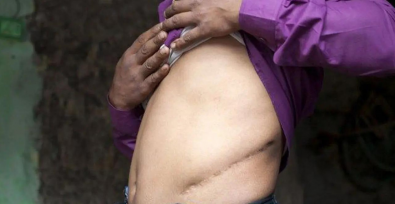In Nepal, there is a village that is nestled in the foothills of the Himalayas, officially called Hokse, but commonly known as “Kidney Valley.” At least one person in every household in this village has had their kidney illegally harvested and sold. Motivated by desperation and poverty, many who bear scars share their stories and reveal a larger issue of exploitation and vulnerability that is pervasive in “Kidney Valley.”
Desperate measures
The prevalence of organ trafficking in “Kidney Valley” is directly correlated to the degree of poverty in the village. Brokers, preying on economic hardships, have coerced countless locals into selling their organs for many years. Cordelia Lynch of sky news reports:
“Locals have desperately tried to shake that infamy in recent years – they feel duped, damaged by it. Some say they were exploited, some claim they were even told their kidneys would regrow. Some have died as a result of what was done to their bodies.”
Kanchha is a forty-year-old man from the Hokse, and he says he is still in pain and unable to work because of the side effects of the surgery. He states, “It’s impossible to count how many people have done it, everywhere, this village, that village, so many people have sold their kidneys.”
Suman, 31, states that he was so financially and emotionally desperate that he felt his only options were either ending his life or traveling to India to sell his Kidney to a woman pretending to be his sister.
Nepali migrant workers and kidney failure
While the village tries to forget its painful history with illegal organ harvesting and the dire consequences that ensued, Nepal is facing another crisis, where once again, Kidneys are at the heart of it. As poverty persists, Nepali migrant workers seek economic relief in other countries only to face a new peril – kidney failure due to harsh and exploitative labor conditions.
Often traveling to work in the Gulf countries, these workers are exposed to extreme heat and dehydration. Upon returning home, once-healthy men are now in desperate need of a kidney transplant.
Jit Bahadur Gurung, a 29-year-old migrant worker in Saudi Arabia says,
“I had to work in extreme heat – around 50 degrees, we didn’t have time to have lunch, go to the toilet, or drink water. I was overheating. Suddenly I felt my feet swelling and I couldn’t walk. Then I was told my kidney had failed.”
Dr. Pukar Shresth, an organ transplant surgeon, explains that he has noticed a pattern of young men going to work in high heat, drinking little water, and returning with “completely failed kidneys,” he states:
“It is very grave because about one-third of all transplants are these labor migrant workers who have come from abroad. This has caused a huge burden to our health resources health facility because they account for more than %30 of the total transplant number in our country.”
Going after the root cause
A wide gap in demand and supply fuels organ trafficking, and the lack of consenting and willing donors has given rise to a black market. It is estimated that one in ten transplanted organs have been trafficked. With the extreme labor conditions that many Nepali migrant men are facing that result in kidney failure, the demand for kidneys is only getting higher, and the incentive for the illegal organ trade is only getting stronger.
By raising awareness and mobilizing support, we can confront the root causes of organ trafficking and advocate for the protection of vulnerable communities like those in “Kidney Valley.” As we navigate the complexities of poverty, exploitation, and health crises, let us stand united in our resolve to safeguard human dignity and combat the scourge of illegal organ harvesting. Join our campaign efforts by signing our petition today.







Freedom United is interested in hearing from our community and welcomes relevant, informed comments, advice, and insights that advance the conversation around our campaigns and advocacy. We value inclusivity and respect within our community. To be approved, your comments should be civil.